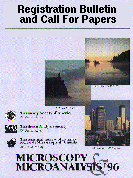

 |  |
Short Courses will be offered on Sunday, August 11, in the Minneapolis Convention Center. Questions about technical content can be addressed to the instructors, whose phone numbers are in the descriptions below. The courses are open only to Meeting registrants. Course fees include notes and handouts, as well as a coffee breaks, but not lunch. Some courses have limited enrollment; they will be filled on a first- come, firstserved basis. (You can register Sunday at the Meeting, but only as course capacity allows.) To reserve a place, use the Advance Registration Form.
Note: for those with limited knowledge of digital imaging, half day courses 96- 03 and 96- 04, offered Sunday morning and afternoon, respectively, are suggested as a sequence.
Course 96- 01: Colloidal Gold Labeling for LM, TEM, SEM, and SFM
Full Day: 9:00- 5:00
Instructors: Ralph Albrecht, Univ of Wisconsin, phone 6082633952, fax 608- 262- 7420, email rma@ahabs.wisc.edu; and P. Sims, Univ of Wisconsin.
Course fee: By July 15, MSA/MAS/MSC/SMC members $120, nonmembers $140; After July 15, $180 for members and nonmembers.
The course is designed to provide information on the use of colloidal gold in studies requiring qualitative and/or quantitative labeling of biological material. Topics to be covered include: synthesis of variously sized gold colloids, conjugation of various molecular species, including antibodies and antibody fragments, to colloidal gold; the use of colloidal gold conjugates to label biological material; procedures and instrumentation for viewing gold conjugates by high resolution light microscopy, conventional and high voltage transmission electron microscopy, and conventional and field emission (BSE and secondary electron) scanning electron microscopy, and strategies for high resolution labeling. Silver enhancement, use of colloidal labels for correlative observation of the same sample by multiple microscopies, and the application of image analysis/processing to studies employing colloidal gold conjugates.
The course is intended for those who are just beginning the use of gold conjugates or who want to expand their knowledge of this field.
Course 96- 02: Scanning Electron Microscopy in the Physical and Biological Sciences
Full Day: 9:00- 5:00
Instructors: Oliver Wells, IBM T.J. Watson Research Center, phone 914- 945- 2321, fax 914- 945- 2141; David Joy, University of Tennessee; and Robert Becker, Univ of Illinois.
Course fee: By July 15, MSA/MAS/MSC/SMC members $120, nonmembers $ 140; After July 15, $ 180 for members and nonmembers.
The basic idea of Scanning Electron Microscopy (SEM) is rather simple. However, greatly improved images can be obtained (and these can be interpreted better) by studying the details of the imageforming process. Non- mathematical explanations of the basic principles will enable the participant to obtain the best possible information from the specimen. Topics to be covered include: the working principle of SEM; electron detectors; electron/specimen interactions; electron scattering as shown by the Monte Carlo method; signal to noise ratio; high resolution secondary electron images; backscattered electron images in the physical and biological sciences; and low voltage SEM.
This course is intended for scientists, technologists and managers in either the physical or biological sciences with a need either to operate an SEM, buy and SEM, or understand the images that can be obtained from it.
- 23
Course 96- 03: Introduction to Digital Imaging Half Day: 8:00 - noon
Instructors: John MacKenzie, North Carolina State Univ, phone 919515- 2664, fax 919- 515- 8293, email supervisor@emc.ncsu.edu; John MacKenzie Jr., North Carolina State Univ, phone 919- 5152664.
Course fee: By July 15, MSA/MAS/MSC/SMC members $60, nonmembers $70; After July 15, $90 for members and non- members.
The course is intended to introduce students to digital imaging. We will examine the various strategies for acquiring, storing, and displaying images. Emphasis will be on basic principles of input, storage, output, and networking, with special attention paid to affordable solutions and components. The course is intended for microscopists with little or no previous knowledge of digital imaging and is appropriate for those both in the biomedical and physical science.
Course 96- 04: Advanced Image Analysis and Image Processing in Microscopy
Half day: 1:00- 5:00
Instructors: John Friel, Princeton Gamma- Tech, phone 6099247310, fax 609- 924- 1729, e- mail jjf@pgt.com; and Eddie B. Prestridge, Princeton Gamma- Tech.
Course fee: By July 15, MSA/MAS/MSC/SMC members $60, nonmembers $70; After July 15, $90 for members and non- members.
The course will illustrate the generic use of image analysis to quantify various aspects of digital images obtained from a microscope. Contrast mechanisms and the information they carry will be reviewed, and standard methods of analysis will be presented. The use of image processing, when necessary to enhance the image, will also be covered with emphasis on the practical use of different processing schemes, including when to use them.
The course is intended for scientists and technologists familiar with either light- or electron- optical microscopy and some knowledge of computer- aided imaging.
Course 96- 05: Atomic Force Microscopy Half day: 1:00- 5:00
Instructor: Phillip Russell, North Carolina State Univ, phone 919515- 7501, fax 919- 515- 2932, email prussell@ncsu.edu.
Course fee: By July 15, MSA/MAS/MSC/SMC members $60, nonmembers $70; After July 15, $90 for members and non- members.
Atomic Force Microscopy has recently evolved rapidly to become a widely applied and highly developed technique for science and engineering. This overview will begin with the basic aspects of AFM instrumentation including tip fabrication, piezoelectric scanner systems, electronics including feedback control systems, data acquisition and imaging systems. Emphasis will be placed on the interaction of all system components to make up a working imaging instrument. Applications of imaging ranging from atomic resolution to large area three- dimensional mapping of manufactured surfaces will be presented with an emphasis on the practical and instrumentation aspects of various imaging situations. Practical techniques including tip selection, scanning speed, imaging and feedback modes (AC, DC, LFM, MFM, shear force, etc.), etc. will be addressed for a variety of applications.
The course is intended for those with little or no experience in AFM.